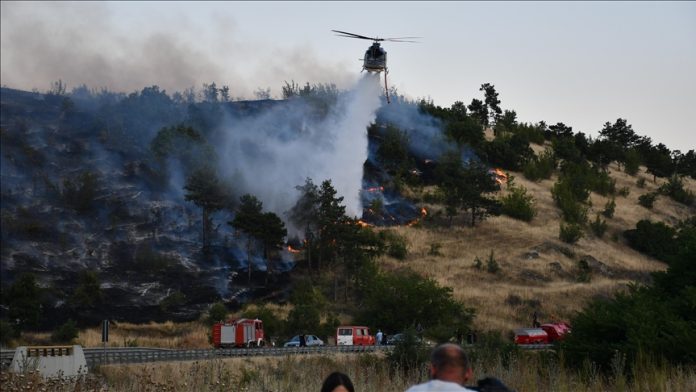This summer, Europe is trying to survive one of the hottest and most dangerous summer periods in recorded history. Abnormal heat caused by high atmospheric pressure and climate change has engulfed almost the entire continent, turning summer into an ordeal for millions of people, nature and infrastructure.
This June may be hottest ever
In particular, countries such as Spain, Portugal, Italy and Greece have faced record temperatures exceeding 40 degrees Celsius.
Spain and Portugal have been at the centre of extreme heat, which is forecast to reach 42 degrees Celsius and above. In Spain, according to the national meteorological agency, June will be the hottest in recorded history. In some regions, such as Seville, temperatures have already exceeded the record 42 degrees Celsius. According to experts, such conditions pose a threat to public health and necessitate the introduction of emergency measures.
In Portugal, where two-thirds of the country has been placed on high alert, temperatures have also reached critical levels.
In Lisbon, temperatures are expected to exceed 42 degrees Celsius. The authorities have announced restrictions on outdoor work during the hottest hours of the day to reduce the risk of fires and protect public health.
Italy has also been affected by extreme weather conditions. In the regions of Lazio, Tuscany, Calabria, Apulia and Umbria, a ban on outdoor work during peak hours has been introduced to reduce the risk of heatstroke and other heat-related problems. Temperatures exceeding 40 degrees Celsius have been recorded in 21 of the 27 major cities, including Rome, Milan and Naples.
Local authorities and trade unions are calling for the restrictions to be extended and for additional measures to be introduced to ensure the safety of citizens, especially vulnerable groups such as the elderly and children. In some regions, cooling centres and water distribution points are already in operation, and mobile teams are being organised to help those in need.
State of emergency declared
Italy and neighbouring Slovenia have declared a state of emergency due to the threat of forest fires. Greece, which has already faced large-scale forest fires in recent weeks, continues to battle natural disasters. A major fire broke out in southern Athens, and dozens of residents were evacuated on the island of Chios, where the fire raged for three days. The authorities deployed 130 firefighters, 12 helicopters and 12 planes to fight the fire and evacuated 40 people from areas at high risk of the fire spreading.
A woman suspected of unintentional arson was arrested after witnesses reported her involvement in the fire. The fires covered about 4,000 hectares of forest and pasture.Meteorologists attribute the increase in the frequency and intensity of extreme weather events to global climate change.
Scientists note that rising temperatures at sea, on land and in the lower layers of the atmosphere contribute to the formation of powerful anticyclones and high temperature waves, which are becoming more frequent and prolonged.
Meteorologist Chris England emphasised that high temperatures over Central and Western Europe create conditions for severe storms, heavy rains and floods, and also increase the risk of forest fires. In some regions, such as France and Germany, the first victims have already been reported: at least three people have died as a result of storms and strong winds.
UK also suffers from extreme temperatures
The United Kingdom is also not immune to the abnormal heat. An “amber heatwave” alert is currently in place, which requires health and social services to prepare for the possible consequences of the heatwave. Temperatures are expected to peak soon, reaching up to 36 degrees Celsius in some areas. In this regard, restrictions on outdoor work have been introduced in some regions, and cooling and water distribution points have been set up.
The authorities are warning of possible risks to vulnerable groups, especially the elderly and children, and recommend that precautions be taken. The extreme heat is putting significant pressure on health care, transport and energy systems. In some regions, there have already been cases of heatstroke, dehydration and deteriorating health among the elderly. Health services are stepping up their hotlines, organising mobile teams and conducting information campaigns on prevention.
In addition, high temperatures are causing power outages, blackouts and water supply disruptions. Some cities are introducing restrictions on electricity and water use to reduce the strain on infrastructure. Forecasts indicate that the abnormal heat could continue for several more weeks, with temperatures reaching new record highs in some regions.
Temperatures are expected to drop after the peak, but the summer is expected to remain very hot overall. Experts warn that such extreme weather events will become more frequent and intense, requiring urgent measures to reduce emissions and adapt infrastructure. Otherwise, the consequences for health, the economy and the environment could be catastrophic.
